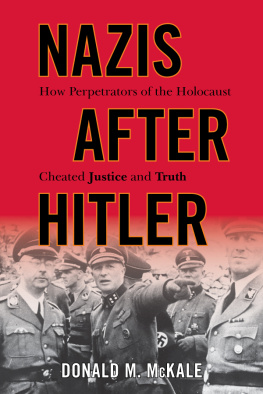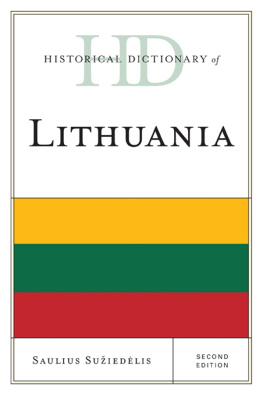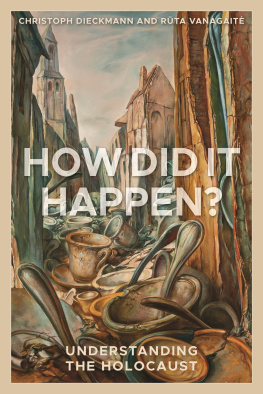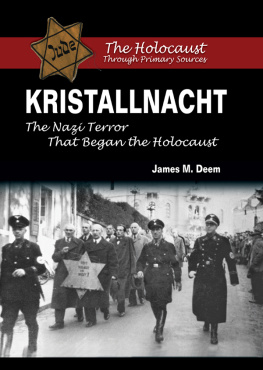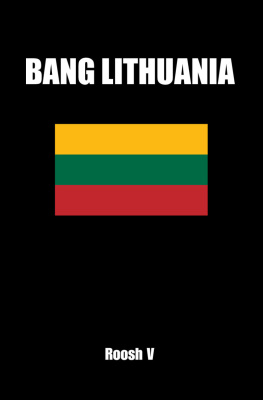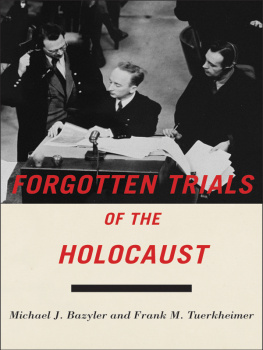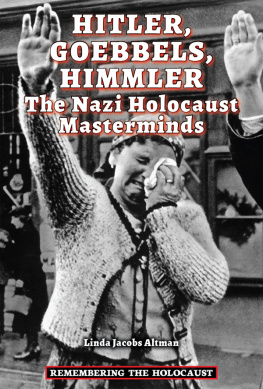Contents
Guide
Rta Vanagait
T his book was written in the fall of 2015 and published in Lithuania in January 2016. We planned the book launch for January 26, the eve of International Holocaust Remembrance Day. On January 27 Lithuanian officials would, as they do annually, go to the mass murder site in Ponar and lay the same sort of wreath they always do at the base of monuments to the murdered Jews of Lithuania. A Jewish violinist would play some Jewish music. The Israeli ambassador would say a few words, as would the leader of the Jewish community. Some vice minister or deputy chancellor would represent Lithuania officially. No one would visit any of the other 226 mass murder sites that are registered in Lithuania. Most people have no idea where they are.
This time we hoped that Holocaust Remembrance Day would be different. We wanted to launch the book in an important and half-forgotten site connected to the history of the Holocaust in Lithuania. So where should a book about the real, hitherto suppressed history of the Holocaust be launched, in a way that would shake up my country?
First possibility: Lukiki Prison. No book had ever been launched in a Lithuanian prison. Yes, this is the same prison from which members of the Special Unit brought people to be murdered in Ponar in 19411943, where Efraim Zuroffs grandfathers brother, also named Efraim, was most likely held in the summer of 1941 before he was shot at Ponar. This is also where my grandfather, Jonas Vanagas, arrested by the Soviets in Kavarskas, was held in 1945 before being deported to Kazakhstan. I know the director of the prison, after all. Call after call, so many letters. No. It wont happen. After long deliberations, the prison director refuses to allow us to launch the book in the prison, due to the increased security such an event would require. The journalists cannot be allowed to enter the prison, let alone thirty kids who would sing a memorial psalm.
Second possibility: the headquarters of the Special Unit, where the Lithuanian Interior Ministry is currently located, in the very heart of Vilnius. I know the minister, who helped me once. I also know his adviser, my former classmate. I call and ask the adviser, who asks the minister. The minister asks the adviser: Have you read this book? Will its launch harm us? The minister has enough problems already. He is thinking politically, i.e., will the Lithuanian government understand why the minister hosted the launch of a book which slanders Lithuania? I apologize to my classmate. I understand the book most probably would harm him.
Another possibility remains: a pizzeria, in the center of the city, which served as the base of the Special Unit. On the second floor, above the pizzeria, are the police department offices, now empty, where the murderers slept. We need the permission of the chiefs of police to get in, and request their approval through someone who knows the responsible officer well. We dont tell the police chief the truththat the book is about the role of Lithuanians in the mass murder of Jews. All we say is that we need the premises for just one hour, for a project. Not a word about the Holocaust. We dont want to harm anyone, but even more, we dont want to lose our last important symbolic venue for the book launch.
Everything goes well. We get permission to use the facilities. The bookOur People: Journey with an Enemyis launched in the pizzeria on a cold day in January, with both enemies, the coauthors, present, as well as the two most popular priests in Lithuania, who also speak about Lithuanian complicity. Reporters from all of the television stations and Internet news outlets are there in the small pizzeria, elbow to elbow. Its hard to breathe.
A sixteen-year-old boy reads the testimony of another sixteen-year-old, a Ponar murderer, on how he killed his victims. Thirty children sing a psalm in Hebrew in memory of those who were killed. (The principal of the school had asked us beforehand whether the kids participation might harm the school.) Efraim Zuroff says Kaddish. Efraim Zuroff cries. Several others who are present do so as well. One of my friends cries so badly that she has to leave the event. Later she said that while she was listening to the presentations, she suddenly realized her own mortality, and the fragility of human life in general.
The entire print run of two thousand copies is snatched up in two days. By January 28, it is no longer available in bookstores. Another four thousand copies are printed quickly, then another run, of five thousand. A book with a print run of five thousand is considered a bestseller in Lithuania. During the first several months after its release, nineteen thousand copies of Our People are printed. The book has unexpectedly taken Lithuania by storm.
The Internet is all abuzz, with thousands of comments about Our People. Lithuania is divided into two camps. One side says: Finally, we will know the truth. The other side says: The Jews deported us, so they got what they deserved. This other side says the book serves Putins propaganda purposes, and that maybe its inspired and/or financed by the Kremlin. Most people dont read the book, but everyone has an opinion about it. People are fighting over the title. Our people were the killers? No, they were not our people; they were her people!
The discussion spills over into readers livesat work, around the dinner table, even becoming the topic of conversation at funerals. Husbands get angry with their wives; parents and children argue. At an Armenian restaurant near my home, prosecutors dine and discuss the book. The consensus: Vanagait obviously works for Putin. The owner, an Armenian, goes over to them and physically grabs them by their collars: Do you actually know Vanagait? You want me to call her? Mechanics at auto-repair shops read Our People with motor oil on their hands. I go to the hospital for a minor operation and a line forms in the post-op ward: The young nurses want me to autograph the book.
An endless series of telephone calls begins. People are opening up to me; they want to tell me what theyve seen. No one has ever interviewed them before, but now there is somebody to whom they can tell their stories. My son and daughter take the calls to protect me in case someone is very aggressive. I just hope nobody will puncture my tires or attack me or my kids physically.
You know, Mom, we are very proud of you, my kids say to me.
This is music to my ears. Ive never heard such words from them.
What do your friends say about the book? I ask my son, who is twenty.
They say, Look, your mom got a lot of money from Putin, so you should pay for our beer.
Kids understand. They dont have the dark prejudices of middle-aged Lithuanians.
The Russian media literally attack both Efraim and me, asking for interviews. We both agree to keep silent because we dont want the book used as a Russian propaganda tool. Western press and TV crews arrive. Foreign journalists are escorted by local cameramen, translators, and coordinators, middle-aged Lithuanian men who have never before visited a Jewish mass murder site.
One educated man who worked for Lithuanian national television, and was a member of the prime ministers office staff, stands at a mass grave in Naujaneriai, in Vilnius. The bones of 1,769 people lie here.
Look, Rta, he says to me. I dont get it somehow. So theyre lying here now, just as they were murdered? Piled up haphazardly? I see that he is shaken. He has never before thought about how they were buried. About how many layers of corpsesbones, hands, headsabout how many of them were shot, while the toddlers were smashed against trees. He has never even tried to imagine, but now he has seen with his own eyes, as it were, and is in a state of shock.


